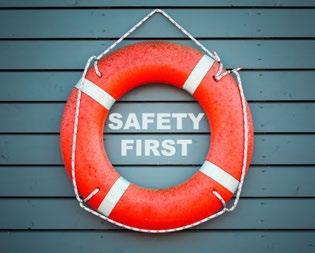Manning and Training
How to Beat Stress Stress can be a blessing in disguise. Even though a certain amount of pressure can be quite helpful and motivating, if we have too much pressure for a long time, we run the risk of a more severe stress reaction. Stress is hidden in most of our everyday activities, so it can easily build up. Therefore, when there is no stress relief, it affects both our physical and mental health, and causes the quality of our life to decline. Below, you will find some useful tips on how to manage your stress, either when you are working on board or when you are ashore with your family and loved ones. Remember, relieving stress can grow into a very pleasant habit and become part of our everyday life. By Chara Markatzinou, Training Coordinator
H O W
ealth and self-care are very important in managing stress. Look after your health. Try to plan breaks throughout the year with a change in activities and surroundings where possible. Make looking after yourself top priority. rganize yourself as best as you can. Being organized will help reduce your stress levels. If you don’t cram too much into the day, you will be able to deal with crises if they arise. ork may be the problem. If so, what aspects are stressful? Could better time management help? What are your priorities? Could you delegate? Could you get more support? Do you need some training? Should you speak to your manager?
T O B E A T
ry not to take on too much. Be realistic about what you can achieve, so set yourself reasonable goals. wn up to yourself that you are feeling stressed – half the battle is admitting it!
e in the moment where possible. Focus on the here and now. Don’t dwell on past or future worries as this will increase your stress levels. at a balanced diet. Eat slowly and mindfully, allowing at least half an hour for each meal. Don’t eat on the run or whilst doing another activity. lcohol does not help stress. Reduce your alcohol intake if you feel you are drinking as a way to cope with stress. ime for things you value is vital, including time for yourself. Plan some valued activities in your life. Stress can make us lose sight of what is most important. Make time for what matters most and you will manage your stress better.
S T R E
olve problems rather than burying your head in the sand. Write down the problems in your life that may be causing stress, and as many possible solutions as you can. Make a plan to deal with each problem. alk things over with a friend or family member or someone else you can trust and share your feelings with. Relationships are key to our resilience. elaxation or leisure time each day is important. Use recommended relaxation techniques, or try some new ways to relax such as aromatherapy or reflexology. xercising regularly is a great stress buster. At least 30 minutes of moderate exercise on five or more occasions per week is excellent for stress control. Walking, running, cycling, dancing, yoga, tennis… It doesn’t matter what the exercise is, but it helps if you enjoy it! ay no and don’t feel guilty.
S S
eek professional help if you have tried these things and your stress is still a problem.
Source: www.nhs.gov.uk
10
Issue 74-December 2020



